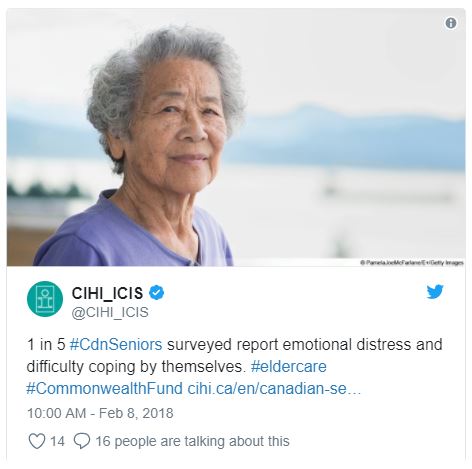Canadians giving up food, heat to pay for prescription drugs: UBC study
SCIENCE, HEALTH & TECHNOLOGY
Feb 13, 2018 | For more information, contact Alex Walls UBC School of Population and Public Health
Tel: 604-822-0530 Cel: 778-984-6173
Email: alex.walls@ubc.ca
https://news.ubc.ca/2018/02/13/canadians-giving-up-food-heat-to-pay-for-prescription-drugs-ubc-study/
The study estimated that 730,000 Canadians reduced their spending on food and 238,000 reduced their spending on home heating due to the cost of prescription drugs. Credit: Charles Williams/Flickr
More than 900,000 Canadians reduced their spending on basic necessities like food and heat to pay for prescription drugs in 2016, according to new research by a team from the University of British Columbia, Simon Fraser University, McMaster University, and The University of Toronto.
Using data from the Statistics Canada Canadian Community Health Survey, the study estimated that 730,000 Canadians reduced their spending on food and 238,000 reduced their spending on home heating due to the cost of prescription drugs.
“We knew lots of Canadians were having trouble paying for medication. Now we know they are trading off other everyday necessities in order to pay for prescription drugs,” said study lead author Michael Law, Canada Research Chair in Access to Medicines and associate professor in UBC’s school of population and public health.
An estimated 1.69 million Canadians, or 8.2 per cent of those who received a prescription in 2016, did not fill prescriptions, skipped doses, or otherwise did not take medication as prescribed because of the cost, the study found.
“Despite Canada’s reputation of having a universal healthcare system, the fact that so many people cannot afford their medicines is a sign that people are falling through the cracks,” Law said.
The study also found that not taking medicines due to cost had consequences for other parts of the health-care system. An estimated 374,000 Canadians reported using extra health-care services because they found medication unaffordable, including more than 300,000 people who reported visiting the doctor again and 93,000 who went to the emergency room.
Young adults, people with lower incomes, and those with no prescription drug insurance were more likely to report problems affording their medicines. These same characteristics also predicted additional healthcare usage and reduced spending on basic necessities. Indigenous people (i.e., those who self-identified as “Aboriginal” on the survey) were almost twice as likely to report affordability challenges, and females were twice as likely as males to report additional health system use as a result of struggling to afford medication.
Law said a range of policy issues were likely at play, including structural barriers in the health-care system such as lack of coverage, and that Canada needs to consider how to provide people with improved access to prescription drugs.
“These results suggest better coverage for these groups would lead to fewer Canadians being unable to afford their medicines and likely improve their health as a result,” said Law.
The study found drugs foregone due to cost were used for a wide variety of health conditions, with drugs that treat depression, anxiety, or other mental health conditions being the most common. Nearly one-third of respondents reported the most recently foregone prescription would have cost $50 or less, suggesting that it was not just the most expensive medications that Canadians were unable to afford.
The study was published in CMAJ Open.
Find other stories about: Michael Law, Prescription drugs, Statistics Canada Canadian Community Health Survey
| 加拿大医疗服务满意度 低于其他发达国家 | ||
| www.bcbay.com | 2018-02-18 19:01:14 加国无忧 | 0条评论 | 查看/发表评论 | ||
|
根据一份新报告,近33%的加拿大老年人表示,他们不满意自己得到的医疗保健服务质量,而在其他被调查的发达国家老年人不满意率平均为24%。 加拿大卫生信息研究所的分析是基于英联邦基金会于2016年在11个发达国家的成年人中进行调查的结果。 “老年人相当程度上依靠初级卫生保健提供者来帮助他们协调来自专家、医院和家庭三种渠道的关怀,他们对自己的主要医疗保健提供者非常满意,但整个医疗系统不太满意,”多伦多CIHI的卫生系统分析和新兴问题研究主管Tracy Johnson 在接受采访时表示。“这可能与他们在获得服务方面面临一些困难有关。” 最大的问题之一是,老年人预约就诊时能否获得医疗结果。Johnson说,另一个问题是,会从医疗服务提供者那里听到互相矛盾或不同的信息。 随着人们寿命的延长,他们可能会患上更多的慢性疾病。然而,卫生保健系统的设计仍然是为了解决诸如阑尾炎或需要在医院治疗的骨折等急性问题,滑铁卢大学教授George Heckman说,他是一位专注于老龄化和心血管疾病的老年病学家。他没有参与CIHI的报告。 Heckman说,在加拿大,卫生保健系统不太适应慢性病老年人的需求。 “慢性疾病的问题在于,你知道他们会在某个时候发作,发作时间通常会有几周,也有机会在恶化之前发现不良征兆,最终需要在医院接受治疗,”Heckman说。“这个时候报告中强调的护理协调问题就变得更加重要。” 例如,Heckman指出,家庭护理提供者可能会注意到患者有呼吸问题,但无法与基础医疗机构的医生分享这些信息。 甚至有些时候,护理人员使用的都不是同一种语言。相比之下,Heckman指出,比利时的家庭护理提供者与其他卫生保健提供者使用相同的医学术语,比如认知测试结果。他们都能够更新病人的电子健康记录。 他说另一个可能的解决方案是将专家嵌入到家庭保健团队中,与医生、护士和药剂师一起照顾病情最复杂的患者。他的研究表明,这种做法改善了所有健保提供者治疗慢性疾病的方式,而不是目前这种将传真发送给专家,预约三个月后就诊的模式。 但是,分别为医疗保健提供者提供资金使得转移资金以促进综合治疗方法变得更难,Heckman说。 Heckman表示,该报告中包括加拿大老年人更长寿的好消息,享有初级保健服务,如家庭医生等,并且比其他国家的老年人对健康有更好的自我感知。 该报告的作者们的研究着眼于健保满意度的四个领域: · 获得专家诊治的机会。 · 精神健康。 · 家庭护理。 · 临终治疗。 总的来说,加拿大人在初级卫生保健提供者层面的就医体验满意度优于国际平均水平,例如常规医生了解他们的病史,让病人参与医疗决策,能在病人身上花费足够的时间,并鼓励病人提出问题。 报告的作者们说,只有65%的能够轻松联系到医疗保健专业人员,并在就诊期间向医生提出问题。 安大略省Peterborough特伦特(Trent )大学的社会学家Stephen Katz说,由于家庭护理一直被认为是解决昂贵的医疗护理问题的办法,因此照顾老年人的护理者中10人中只有2人得到政府帮助就很能说明问题。卡茨研究老龄化和老年学。 老年人的户外安全 在一封电子邮件中,Katz说,CIHI将研究限制在健康生活方式到饮食、运动和选择感,而没有考虑环境的安全性或交通是否适合老年人。
Heckman建议,城市和社区应设计更多适合老年人的地方,帮助那些在步行距离内有困难的老年人。例如,如果公园缺长椅或灯光不亮,那么老年人宁可留在室内,也不与其他人一起锻炼和社交。 CIHI作者还发现: · 三分之一的老年人患有至少三种慢性病。 · 32%的老年人服用五种或更多种常规药物。 · 14%的人面临心理健康问题,如抑郁或焦虑。 11个参与调查的国家有澳大利亚、加拿大、法国、德国、荷兰、新西兰、挪威、瑞典、瑞士、英国和美国。 英联邦基金将自己描述为旨在促进高效运作的医疗保健体系的美国私人基金会。CIHI是一个独立的非营利组织,提供有关加拿大人健康系统和加拿大人健康状况的信息。 |
||
| 百万加拿大人为了买这个 连饭都不吃了 | |
| www.bcbay.com | 2018-02-18 09:19:31 加国无忧 | 1条评论 | |

最新研究显示,2016年有大约100万加拿大人为了支付医药处方,无奈下只好缩减在食物和取暖等生活必需品上的支出。
近日,由英属哥伦比亚大学人口与公共卫生学院副教授Michael Law发表的论文显示,2016年有73万加拿大人省下购买食物的钱去买药,另外23.8万加拿大人则选择省掉家里的取暖费用。
“我们现在知道很多加拿大人在支付药物的方面遇到了麻烦,”Law说:“越来越多的人为了支付处方药的费用,开始节省家里其他生活必需品的开支。”
作为加拿大社区健康调查的一部分,这项研究总共在财务状况和医药支出的问题上调查了28,091人。其中那些没有保险的人,收入较低的人,以及更年轻的人,在医药支出上都多少遇到了麻烦。
另外研究还显示,2016年开过处方药的加拿大人的8.2%,大约160万人,因为没钱,所以并没有购买或者买够那些他们需要的药物。而不吃药更会对国家的医疗健康系统造成压力,因为不抓紧治病延误病情只会令病人多次去医院看医生。

来自英属哥伦比亚大学,西蒙菲莎大学,麦克马斯特大学以及多伦多大学的研究人员表示,加拿大政府需要重新审视处方药方面的政策。“尽管加拿大的全民医疗体系的名声很好,但是至今仍有人连药都买不起,”Law说道。
加拿大是世界上唯一一个拥有全民医疗保健却没有普及药物覆盖的国家,有证据表明,加拿大的药价仅次于美国,位居世界第二。此前卑诗省曾经宣布年收入低于3万加元者,可以免费或者凭借减少免赔额获取处方药。卫生部长Adrian Dix也曾表示,年收入在1.5万和3万加元的人们可以不再支付任何药物的免赔额。


